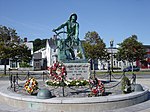Stage Fort
1635 establishments in the Massachusetts Bay Colony1898 disestablishments in MassachusettsAmerican Civil War fortsAmerican Revolutionary War fortsBritish forts in the United States ... and 4 more
Buildings and structures in Gloucester, MassachusettsColonial forts in MassachusettsForts in MassachusettsWar of 1812 forts

Stage Fort was a fort that existed from 1635 to 1898 on Stage Head in what is now Stage Fort Park in Gloucester, Massachusetts.Stage Head was named for a fishing "stage" dating back to the original settlement by the Dorchester Adventurers Company circa 1624. The area was first fortified in 1635 and garrisoned intermittently from then until the Spanish–American War.
Excerpt from the Wikipedia article Stage Fort (License: CC BY-SA 3.0, Authors, Images).Stage Fort
Hough Avenue, Gloucester
Geographical coordinates (GPS) Address Nearby Places Show on map
Geographical coordinates (GPS)
| Latitude | Longitude |
|---|---|
| N 42.605 ° | E -70.675833333333 ° |
Address
Hough Avenue
01930 Gloucester
Massachusetts, United States
Open on Google Maps










